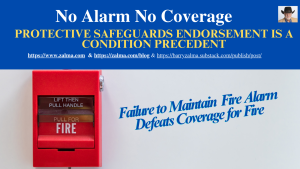No Alarm No Coverage

Post 4754
See the full video at https://rumble.com/v4isqgu-no-alarm-no-coverage.html and at https://youtu.be/IpOUzfD1KWM
Kinsale Insurance Company (“Kinsale”) sought declaratory relief against Sea Brook Harbor and Marine, et al (collectively “Seabrook”) arguing that Seabrook failed to comply with a condition precedent in the insurance policy it issued to Seabrook and that consequently there was no coverage for a fire occurring at Seabrook’s facility.
In Kinsale Insurance Company v. Sea Brook Marine, L.L.C.; et al. v. Central Monitoring, Incorporated et ap, No. 23-30436, United States Court of Appeals, Fifth Circuit (March 7, 2024) the Fifth Circuit explained the importance of a condition requiring protective safeguards.
The insurance policy contained a “Protective Safeguards Endorsement,” requiring that Seabrook maintain an “Automatic Fire Alarm, protecting the entire building, that is: a. Connected to a central station; or b. Reporting to a public or private fire alarm station.” The summary judgment evidence established that, although Seabrook had a security and theft monitoring system, it did not have a fire monitoring system. Kinsale moved for summary judgment in its favor.
Seabrook contended that it “had a good faith belief that the property was covered by a centrally monitored fire alarm system, which included hardwired smoke detectors.”
Seabrook further argued that Kinsale either waived its right to exercise the protective safeguards endorsement or should be estopped from using it to deny coverage because the absence of a centrally monitored fire alarm system did not increase the “moral or physical hazard” under the policy. Specifically, Seabrook argued that “a centrally monitored [fire] alarm would not have alerted the New Orleans Fire Department any sooner in battling this conflagration” because the fire’s origin was outside of the Seabrook office building and the wind driven fire would have started on the office building’s exterior in the same area as the alarm monitoring equipment.
The district court determined that Seabrook’s maintenance of a centrally monitored, automatic fire alarm was a condition precedent to insurance coverage under the policy. It was undisputed that Seabrook did not satisfy that condition. It granted summary judgment in favor of Kinsale that the insurance policy it issued to Seabrook provided no coverage for the fire occurring at Seabrook’s facility.
Under Louisiana law an insurance policy is a contract and is construed using the general principles for contract interpretation. The parties’ intent, as reflected by the words of the policy, determines the extent of coverage. If the words of the policy are clear and unambiguous, it must be enforced as written.
The Fifth Circuit noted that Seabrook appears to be asserting that Kinsale has no right to deny coverage for the fire unless it proves that Seabrook misrepresented information to Kinsale with the intent to deceive.
The Fifth Circuit disagreed.
The policy provisions at issue in this case are not ambiguous. The Protective Safeguards Endorsement clearly provides a condition of the policy. When the words of an insurance policy are clear and unambiguous, the words must be enforced as written. The Safeguards provisions made clear that when the insured has not maintained an automatic fire alarm connected to a central station or reporting to a public or private fire alarm station, the policy provides no coverage for the fire. Seabrook did not maintain such an alarm, whether viewed as a condition of the policy or as an exclusion, at the time of the fire, coverage for the fire was precluded.
Kinsale is not required to prove that Seabrook misrepresented information with an intent to deceive in order to deny coverage in this case.
Kinsale did not contend that Seabrook misrepresented information in its insurance application or in negotiating with Kinsale, and it does not seek to void or rescind its policy based on any such misrepresentation. Instead, Kinsale argues that it is entitled to deny Seabrook’s fire insurance claim because a condition precedent was not met and/or an exclusion applies.
It is undisputed that Seabrook did not have a centrally monitored fire alarm at the time of the fire. As the district court found, the absence of such an alarm undoubtedly increased the physical hazard under the policy.
The Fifth Circuit concluded that there can be no doubt that the lack of such an alarm increased the physical hazard of a fire spreading and causing further damage, as the lack of an alarm would result in either no notice or delayed notice to fire responders.
Protective Safeguards endorsements are not suggestions they are conditions precedent. As a result, failure to provide the protective safeguard required by the policy deprives the insured of coverage for a loss under the policy even if the alarm system would have been irrelevant to the effect of the condition. Every person acquiring insurance with such a protective safeguard endorsement must comply fully with the endorsement or agree it has paid for an insurance policy that provides no coverage for a loss.
 (c) 2024 Barry Zalma & ClaimSchool, Inc.
(c) 2024 Barry Zalma & ClaimSchool, Inc.
Please tell your friends and colleagues about this blog and the videos and let them subscribe to the blog and the videos.
Subscribe to my substack at https://barryzalma.substack.com/publish/post/107007808
Go to Newsbreak.com https://www.newsbreak.com/@c/1653419?s=01
Go to X @bzalma; Go to Barry Zalma videos at Rumble.com at https://rumble.com/c/c-262921; Go to Barry Zalma on YouTube- https://www.youtube.com/channel/UCysiZklEtxZsSF9DfC0Expg.
Go to the Insurance Claims Library – https://lnkd.in/gwEYkpro
Like this:
Loading…
Related
About Barry Zalma
An insurance coverage and claims handling author, consultant and expert witness with more than 48 years of practical and court room experience.







